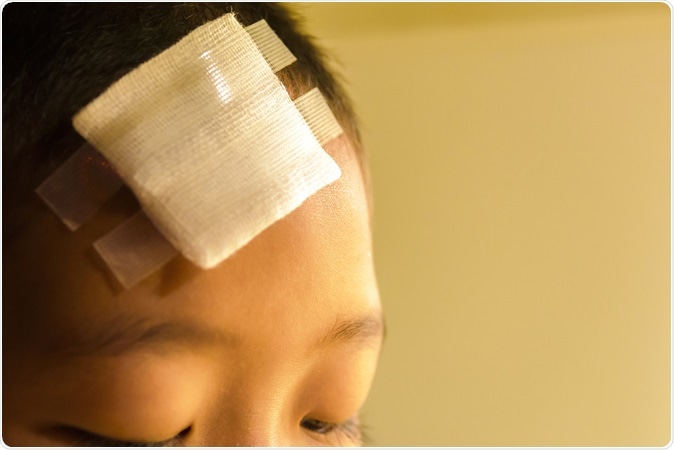Researchers at the Penn State College of Medicine have found that tiny molecules present in the saliva can predict the occurrence, length and duration of a concussion in a child. The study titled, “Association of Salivary MicroRNA Changes With Prolonged Concussion Symptoms”, was published in the latest issue of JAMA Pediatrics on the 20th of November 2017.

Image Credit: Bigbubblebee99 / Shutterstock
The tiny molecules that the researchers assessed and analyzed are called microRNAs which are actually small pieces of RNAs that do not code for any proteins. The team analyzed the levels of these microRNAs. Some of these microRNAs, they noted could help diagnose if a concussion had occurred in a child. The duration of the concussion or for how long the child was concussed can also be predicted from the levels of these. Until now patient reported symptoms were the markers of the time a person has been concussed as there were no other measures.
Steven Hicks, an assistant professor of pediatrics and part of this study said that this method could be more sound compared to relying on patient-provided information. Hicks said this was the “objective marker” that was being looked for in these cases. He explained that earlier blood tests were conducted to look for proteins that were raised during concussions. However there is something called a blood-brain-barrier that does not allow all proteins and compounds to pass to and from the brain to the blood and vice versa. This blood brain barrier stopped the proteins from showing up in blood and thus these proteins could not be used as an effective marker for the concussion, Hicks said. Using these microRNAs as a marker is a simpler and more effective way to detect and diagnose the concussions.
Concussions are caused due to a blow to the head during play, falls or in a road traffic accident. There are symptoms such as headache, loss of memory for short periods of time, nausea and sometimes vomiting and unconsciousness. In most people the concussions and its effects clear up within a couple of weeks. In some the symptoms may persist longer due to more severe injury. Hicks said that he encountered kids with concussions during his practice and mostly rely upon the parents’ and child’s memory to decide when the child has had the concussion from. He said the patient is usually asked to rest until the brain has had time to heal. If the onset of the concussion is not known, the down time is actually and “educated guess”.
For this study the team looked at 52 kids with concussions between ages 7 and 21 years. They evaluated all the participants with the Sport Concussion Assessment Tool (SCAT-3) to check for the symptoms and the severity of the concussion. They repeated the test four weeks after the injury date. On both initial and follow up visits the patient’s saliva was also collected and the levels of the microRNAs were measured. Five microRNAs (miR-320c-1, miR-133a-5p, miR-769-5p, let-7a-3p, and miR-1307-3p) were found in the saliva samples. Presence of these meant that the symptoms would persist longer. They could accurately predict if the symptoms would last longer in 42 out of 50 of the study participants. Hicks said that the accuracy levels were 85 percent and SCAT-3 report on the other hand gives 64 percent accuracy. He added that if the decisions were made only based on what the patient reported, the accuracy went down to the fifties. Thus, knowing the duration of the concussion would ensure correct care for the patient with the right diagnosis. Hicks added, “The ultimate goal is to be able to objectively identify that a concussion has happened and then predict how long the symptoms will go on for.”